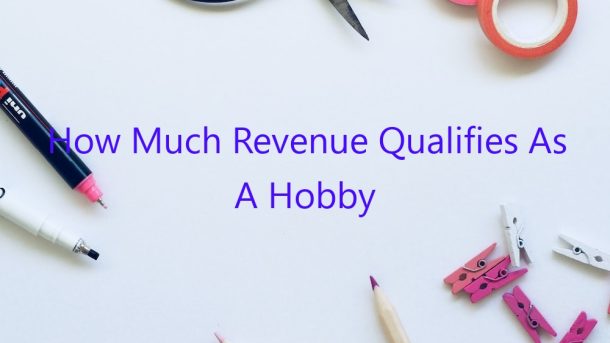When it comes to taxes, there are a lot of gray areas. One such area is how much revenue qualifies as a hobby. Determining whether or not your business is a hobby can have serious consequences, so it’s important to understand the rules.
The IRS defines a hobby as “an activity engaged in for sport or recreation, not for profit.” In other words, if you’re not making money from your business, it’s likely a hobby. The key question the IRS looks at is whether you’re engaged in the activity with the intention of making a profit.
There are a few factors the IRS looks at to determine whether you have a profit motive. One is how much time and effort you put into the business. If you’re only doing the activity for a few hours a week, it’s less likely you’re doing it with the intention of making a profit. The IRS also looks at how much money you’ve lost on the activity. If you’ve lost money every year, that’s a sign you’re not doing it with the intention of making a profit.
Finally, the IRS looks at your financial records. If you’re not treating the business like a business, with separate bank accounts and records, that’s a sign you’re not doing it with the intention of making a profit.
If your business meets any of these criteria, the IRS will likely classify it as a hobby. That doesn’t mean you’re automatically in trouble – you may still be able to claim deductions associated with the business. However, you can’t claim any losses from the business on your tax return.
It’s important to understand the rules around hobbies so you can make the most of your business deductions. If you’re not sure whether your business is a hobby, speak to an accountant or tax specialist.
Contents [hide]
How much money can you make to be considered a hobby?
How much money can you make to be considered a hobby?
The answer to this question largely depends on the type of hobby someone pursues. Some hobbies, such as collecting coins or stamps, can be profitable if pursued as a business venture. However, many hobbies, such as scrapbooking or bird watching, typically do not generate much income.
For the most part, a hobby is something someone does for fun and does not expect to make money from. There are, however, a few ways to make a little money from a hobby. One option is to sell the products of the hobby. For example, a person who quilts can sell quilts, a person who crochets can sell crocheted items, and a person who makes jewelry can sell jewelry.
Another option is to provide a service related to the hobby. For example, a person who is good at carpentry can offer carpentry services, a person who is good at gardening can offer gardening services, and a person who is good at painting can offer painting services.
Generally speaking, the more time and effort someone puts into their hobby, the more money they can make from it. However, it is important to note that most hobbies are not intended to be a source of income, and pursuing a hobby primarily for the purpose of making money can be counterproductive.
How much does a business have to make to not be considered a hobby?
There is no definitive answer to the question of how much a business must make to not be considered a hobby. The Internal Revenue Service (IRS) defines a business as “an activity carried on to make a profit.” However, there are many factors that contribute to a business being considered a hobby, including the amount of profit the business makes and the taxpayer’s intent when starting the business.
The IRS considers a business to be a hobby if it does not make a profit in three out of five years. A business that does not make a profit in any of the first three years is generally considered a hobby. In order to determine if a business is making a profit, the IRS looks at the business’s income and expenses. Income is calculated by subtracting expenses from revenue. If the business’s expenses exceed its revenue, the business is not making a profit and is considered a hobby.
There are a number of factors that the IRS considers when determining if a business is a hobby. Some of these factors include the taxpayer’s intent when starting the business, the time and effort the taxpayer puts into the business, and the taxpayer’s experience in the industry. The IRS also looks at whether the business is making a profit in relation to the amount of time and money the taxpayer has invested in the business.
If a business is considered a hobby, the taxpayer may be subject to income taxes on the income the business generates. The taxpayer may also be subject to self-employment taxes on the income the business generates. In order to avoid being taxed on the income generated by a hobby, the taxpayer must demonstrate that the business is not a hobby. This can be done by showing that the business is making a profit and that the business is operated with the intent to make a profit.
There is no definitive answer to the question of how much a business must make to not be considered a hobby. The amount of profit a business must make to not be considered a hobby depends on a number of factors, including the IRS’s definition of a business and the taxpayer’s intent when starting the business.
How does IRS determine hobby?
The Internal Revenue Service (IRS) is responsible for tax collection and enforcement in the United States. Part of their job is to determine whether certain activities constitute hobbies or businesses. This article will explain how the IRS determines whether an activity is a hobby or a business.
The IRS looks at several factors when making this determination. The most important factor is whether the activity is engaged in for profit. The IRS will consider whether the taxpayer is engaged in the activity with the intent to make a profit. They will also consider the amount of time and money the taxpayer has invested in the activity, as well as whether the taxpayer has any income or losses from the activity.
If the activity is not engaged in for profit, the IRS will determine if it is conducted with the intent to make a profit. The IRS will also look at the facts and circumstances of each case. Some factors they will consider include the amount of time the taxpayer spends on the activity, the amount of money the taxpayer has invested in the activity, and whether the taxpayer has any income or losses from the activity.
If the activity is not engaged in for profit and is not conducted with the intent to make a profit, the IRS will generally classify it as a hobby. A taxpayer who engages in a hobby can still claim deductions related to the hobby, but those deductions are limited.
It is important to note that the IRS’s determination of whether an activity is a hobby or a business is not always final. A taxpayer may be able to change the IRS’s determination by showing that the activity is actually engaged in for profit.
Do you have to report income from a hobby?
No, you don’t have to report income from a hobby. The IRS doesn’t consider income from a hobby to be taxable. However, if your hobby turns into a business, you may have to start reporting that income.
There are a few things to keep in mind if you’re thinking of turning your hobby into a business. First, you need to be able to show that you’re making a profit. That means your income from the business should be more than your expenses. You should also be prepared to pay income taxes on the business income.
If you do decide to turn your hobby into a business, be sure to keep careful records. That will make it easier to track your income and expenses.
Do I need to report my hobby as a business?
There are many people who enjoy hobbies such as arts and crafts, woodworking, gardening, and more. However, some people may wonder if they need to report their hobby as a business. The answer to this question depends on a few factors.
First, it is important to determine if your hobby is making a profit. If you are making a profit, then you are required to report your hobby as a business. However, if you are not making a profit, you are not required to report your hobby as a business.
Another factor to consider is the type of hobby you are engaged in. Certain hobbies, such as selling arts and crafts online, may be considered a business, even if you are not making a profit.
If you are unsure whether or not you need to report your hobby as a business, it is best to speak with an accountant or tax professional. They will be able to help you determine if you need to report your hobby and, if so, what steps you need to take in order to do so.
What is the hobby loss rule?
The hobby loss rule is a tax law that allows taxpayers to deduct losses from their hobbies up to the amount of their income from the hobby. This tax law is in place to help taxpayers who incur losses from their hobbies offset the income they earn from those activities.
There are a few qualifications that a taxpayer must meet in order to claim a loss on their taxes related to their hobby. The taxpayer must be able to show that they are engaged in the hobby for profit, and they must also be able to show that they are not engaged in the hobby for personal pleasure. In order to show that they are engaged in the hobby for profit, the taxpayer must be able to demonstrate that they are trying to make a profit, and that they are not engaging in the hobby as a way to offset other income.
The hobby loss rule is also subject to some limitations. The taxpayer can only deduct losses up to the amount of their income from the hobby. If the taxpayer has losses that exceed their income from the hobby, they cannot claim the loss on their taxes. Additionally, the taxpayer cannot claim any losses from a hobby on their taxes if they are claiming any other income from the same hobby.
The hobby loss rule is a helpful tax law for taxpayers who incur losses from their hobbies. By being able to offset the income they earn from their hobbies with their losses, these taxpayers can reduce the amount of taxes they owe.
What defines a business as a hobby?
In general, the term “hobby” refers to a regular activity that is done for enjoyment, relaxation, or pleasure. For some people, this might include activities like painting, sculpting, sewing, woodworking, fishing, or gardening. In many cases, these activities may be pursued on a part-time basis in addition to other work or responsibilities.
For others, a hobby may be more involved and time-consuming, such as running a small business or becoming a serious collector of a particular item. In either case, the key factor is that the individual pursues the hobby activities primarily for their own personal satisfaction and enjoyment, rather than with the intention of making a profit.
While there is no definitive answer to the question of what defines a business as a hobby, the general consensus is that if the individual is generating substantial income from the hobby activities, then it is likely no longer considered a hobby. This is particularly true if the individual is relying on the income generated from the hobby to support themselves and their family.
On the other hand, if the individual is engaged in hobby activities primarily for personal enjoyment and relaxation, then it is typically considered to be a hobby. This is even true if the individual derives some level of income from the hobby, as long as it is not the main purpose of the activity.
Ultimately, the definition of a business as a hobby is somewhat subjective, and it can vary depending on the specific circumstances. However, the key factor is that the individual is pursuing the activities primarily for their own personal satisfaction and enjoyment, rather than with the intention of making a profit.




